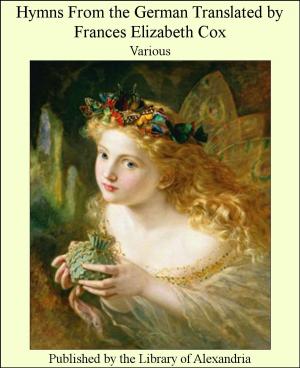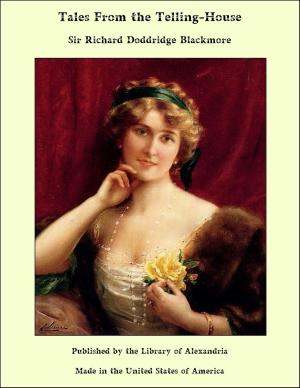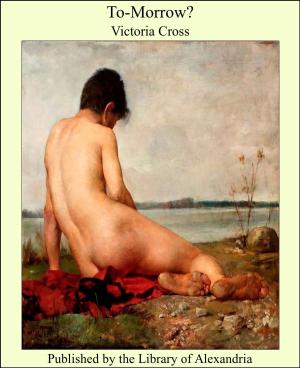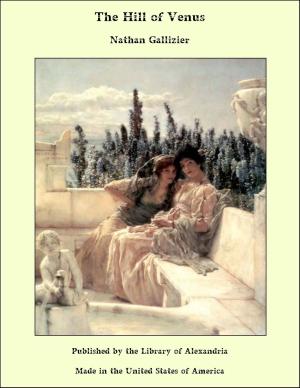| Author: | Alfred de Vigny | ISBN: | 9781465550064 |
| Publisher: | Library of Alexandria | Publication: | March 8, 2015 |
| Imprint: | Language: | English |
| Author: | Alfred de Vigny |
| ISBN: | 9781465550064 |
| Publisher: | Library of Alexandria |
| Publication: | March 8, 2015 |
| Imprint: | |
| Language: | English |
It was not until one hundred years after this poet's birth that it became clearly recognized that he is one of the most important of all the great writers of France, and he is distinguished not only in fiction, but also in poetry and the drama. He is a follower of Andre Chenier, Lamartine, and Victor Hugo, a lyric sun, a philosophic poet, later, perhaps in consequence of the Revolution of 1830, becoming a "Symbolist." He has been held to occupy a middle ground between De Musset and Chenier, but he has also something suggestive of Madame de Stael, and, artistically, he has much in common with Chateaubriand, though he is more coldly impersonal and probably much more sincere in his philosophy. If Sainte- Beuve, however, calls the poet in his Nouveaux Lundis a "beautiful angel, who has been drinking vinegar," then the modern reader needs a strong caution against malice and raillery, if not jealousy and perfidy, although the article on De Vigny abounds otherwise with excessive critical cleverness. At times, indeed, under the cruel deceptions of love, he seemed to lose faith in his idealism; his pessimism, nevertheless, always remained noble, restrained, sympathetic, manifesting itself not in appeals for condolence, but in pitying care for all who were near and dear to him. Yet his lofty prose and poetry, interpenetrated with the stern despair of pessimistic idealism, will always be unintelligible to the many. As a poet, De Vigny appeals to the chosen few alone. In his dramas his genius is more emancipated from himself, in his novels most of all. It is by these that he is most widely known, and by these that he exercised the greatest influence on the literary life of his generation. Alfred-Victor, Count de Vigny, was born in Loches, Touraine, March 27, 1797. His father was an army officer, wounded in the Seven Years' War. Alfred, after having been well educated, also selected a military career and received a commission in the "Mousquetaires Rouges," in 1814, when barely seventeen. He served until 1827, "twelve long years of peace," then resigned. Already in 1822 appeared a volume of 'Poemes' which was hardly noticed, although containing poetry since become important to the evolution of French verse: 'La Neige, le Coy, le Deluge, Elva, la Frigate', etc., again collected in 'Poemes antiques et modernes' (1826). Other poems were published after his death in 'Les Destinies' (1864). Under the influence of Walter Scott, he wrote a historical romance in 1826, 'Cinq-Mars, ou une Conjuration sans Louis XIII'. It met with the most brilliant and decided success and was crowned by the Academy. Cinq- Mars will always be remembered as the earliest romantic novel in France and the greatest and most dramatic picture of Richelieu now extant. De Vigny was a convinced Anglophile, well acquainted with the writings of Shakespeare and Milton, Byron, Wordsworth, Shelley, Matthew Arnold, and Leopardi. He also married an English lady in 1825—Lydia Bunbury. Other prose works are 'Stello' (1832), in the manner of Sterne and Diderot, and 'Servitude et Grandeur militaire' (1835), the language of which is as caustic as that of Merimee. As a dramatist, De Vigny produced a translation of 'Othello—Le More de Venice' (1829); also 'La Marechale d'Ancre' (1832); both met with moderate success only. But a decided "hit" was 'Chatterton' (1835), an adaption from his prose-work 'Stello, ou les Diables bleus'; it at once established his reputation on the stage; the applause was most prodigious, and in the annals of the French theatre can only be compared with that of 'Le Cid'. It was a great victory for the Romantic School, and the type of Chatterton, the slighted poet, "the marvellous boy, the sleepless soul that perished in his pride," became contagious as erstwhile did the type of Werther
It was not until one hundred years after this poet's birth that it became clearly recognized that he is one of the most important of all the great writers of France, and he is distinguished not only in fiction, but also in poetry and the drama. He is a follower of Andre Chenier, Lamartine, and Victor Hugo, a lyric sun, a philosophic poet, later, perhaps in consequence of the Revolution of 1830, becoming a "Symbolist." He has been held to occupy a middle ground between De Musset and Chenier, but he has also something suggestive of Madame de Stael, and, artistically, he has much in common with Chateaubriand, though he is more coldly impersonal and probably much more sincere in his philosophy. If Sainte- Beuve, however, calls the poet in his Nouveaux Lundis a "beautiful angel, who has been drinking vinegar," then the modern reader needs a strong caution against malice and raillery, if not jealousy and perfidy, although the article on De Vigny abounds otherwise with excessive critical cleverness. At times, indeed, under the cruel deceptions of love, he seemed to lose faith in his idealism; his pessimism, nevertheless, always remained noble, restrained, sympathetic, manifesting itself not in appeals for condolence, but in pitying care for all who were near and dear to him. Yet his lofty prose and poetry, interpenetrated with the stern despair of pessimistic idealism, will always be unintelligible to the many. As a poet, De Vigny appeals to the chosen few alone. In his dramas his genius is more emancipated from himself, in his novels most of all. It is by these that he is most widely known, and by these that he exercised the greatest influence on the literary life of his generation. Alfred-Victor, Count de Vigny, was born in Loches, Touraine, March 27, 1797. His father was an army officer, wounded in the Seven Years' War. Alfred, after having been well educated, also selected a military career and received a commission in the "Mousquetaires Rouges," in 1814, when barely seventeen. He served until 1827, "twelve long years of peace," then resigned. Already in 1822 appeared a volume of 'Poemes' which was hardly noticed, although containing poetry since become important to the evolution of French verse: 'La Neige, le Coy, le Deluge, Elva, la Frigate', etc., again collected in 'Poemes antiques et modernes' (1826). Other poems were published after his death in 'Les Destinies' (1864). Under the influence of Walter Scott, he wrote a historical romance in 1826, 'Cinq-Mars, ou une Conjuration sans Louis XIII'. It met with the most brilliant and decided success and was crowned by the Academy. Cinq- Mars will always be remembered as the earliest romantic novel in France and the greatest and most dramatic picture of Richelieu now extant. De Vigny was a convinced Anglophile, well acquainted with the writings of Shakespeare and Milton, Byron, Wordsworth, Shelley, Matthew Arnold, and Leopardi. He also married an English lady in 1825—Lydia Bunbury. Other prose works are 'Stello' (1832), in the manner of Sterne and Diderot, and 'Servitude et Grandeur militaire' (1835), the language of which is as caustic as that of Merimee. As a dramatist, De Vigny produced a translation of 'Othello—Le More de Venice' (1829); also 'La Marechale d'Ancre' (1832); both met with moderate success only. But a decided "hit" was 'Chatterton' (1835), an adaption from his prose-work 'Stello, ou les Diables bleus'; it at once established his reputation on the stage; the applause was most prodigious, and in the annals of the French theatre can only be compared with that of 'Le Cid'. It was a great victory for the Romantic School, and the type of Chatterton, the slighted poet, "the marvellous boy, the sleepless soul that perished in his pride," became contagious as erstwhile did the type of Werther















